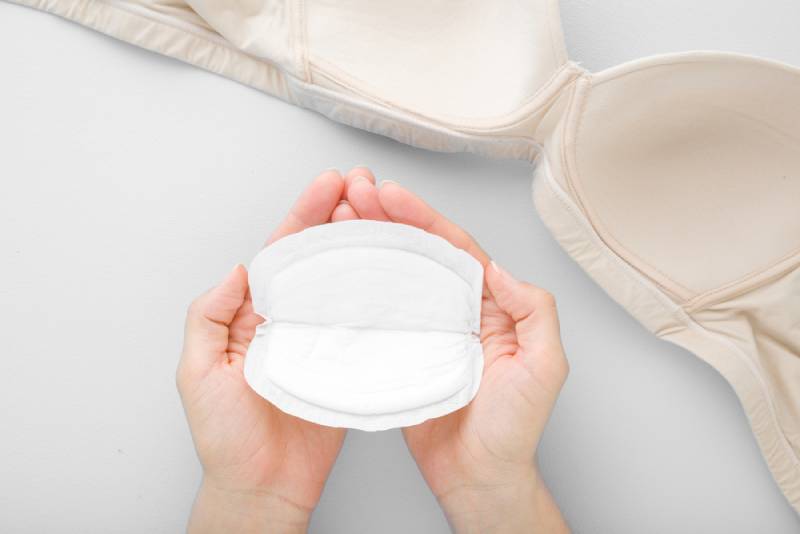Are you convinced you’re not making enough milk for your little one? Do you feel like your body is sending you signs your milk supply is decreasing but you’re still not sure? Well, you’ve come to the right place.
Some of the signs that indicate you’re not making enough breast milk for your baby include poor weight gain, irritability and fussiness after feedings, and even extremes such as dehydration.
I’m sure this sounds nerve wracking, especially since it’s very hard for a breastfeeding mama to tell how much milk their baby has had during a nursing session.
For this reason, I’ll inform you about common changes that are often mistaken as a sign of a drop in milk supply, when in fact, they’re just a way for your body to adjust to producing milk without causing you too much discomfort.
If you are worried about your breast milk supply, I have also included tips on how to improve it so that your milk production is back to normal as soon as possible.
4 Signs Your Milk Supply Is Decreasing
1. Your baby isn’t gaining enough weight

Poor weight gain is always a cause for concern for new mothers. If you’re worried that your breast milk supply is causing your baby to gain weight slowly, it’s important to know that some weight loss is normal in the first couple of days after the baby is born.
Some infants lose as much as 10 percent of their birth weight and this is completely normal, but then they should start gaining weight according to an expected schedule – around 4 to 7 ounces on a weekly basis.
As this could be one of the signs your milk supply is decreasing, talk to your pediatrician right away to see what the possible causes are and what you can do to help your little one improve their weight gain. Some parents even get a baby scale to keep track of their munchkin’s growth.
2. Fussiness after feedings

A well-fed baby is a happy baby. After a nursing session, your munchkin should be happy and might even drift off to sleep. One of the telltale signs your milk supply is decreasing is a baby who is fussy after a feed, which means that there wasn’t enough milk for your baby to get enough sustenance.
While feeding your little one, there are signs to look out for that will let you know your milk supply is adequate. For example, the baby’s cheeks should appear full while nursing which means that there is sufficient milk.
Most babies make noises while feeding, such as loud gulping sounds, that make it clear they are getting a good amount of milk. Although not all babies produce this kind of noise while nursing, it could mean that your breast milk production has dropped, especially if your munchkin used to gulp loudly during feedings.
3. Not enough dirty diapers

When a new mom is exclusively pumping, it is easier to notice a drop in milk supply since she can measure precisely how much milk she has pumped. A mom who breastfeeds, however, has different signs to look out for and one of them is a wet diaper.
Depending on your baby’s age, there is an approximate minimum of wet diapers you should change in a day. In the early days of your baby’s life, fewer diaper changes are needed. But after the first week, the number increases.
A breastfed baby who is a week old, for example, has between 6 to 8 dirty diapers in a period of 24 hours but it’s possible that there will be more. This is why it’s important to keep track of your baby’s diaper changes, note any unusual changes, and take them up with your doctor.
4. Your baby is showing signs of dehydration

If you’re not producing much breast milk, there is a risk that your baby will become dehydrated. This is why I recommend that all moms and dads become familiar with the signs of dehydration in babies so they can get medical care before the baby’s condition escalates.
A common sign of dehydration is dark yellow urine and less than 6 dirty diapers in a 24-hour period. Your baby could be crying without producing any tears and have dry lips with cracked skin.
The baby could be very cranky or sleep more than usual. In cases of severe dehydration, it’s important to see a doctor right away so that your baby can get rehydrated ASAP.
False Alarms Of A Drop In Milk Supply
Apart from the signs your milk supply is decreasing, there are a few false alarms that could whip you into a panic and trick you into thinking you aren’t producing enough milk. Most of the time, it’s just your body adjusting and getting more comfortable with breastfeeding.
1. Your breasts feel soft again

In the early weeks of your baby’s life, many breastfeeding mamas experience engorgement or just a feeling of heaviness in their breasts. This is normal for the first few weeks as your breast milk production regulates itself and you learn how to breastfeed your little one.
Afterward, you can expect your breasts to become soft again. This doesn’t, however, mean you’re not making enough breast milk, so don’t worry. Continue nursing as usual, while enjoying the fact that the uncomfortable engorgement is gone.
2. Your breasts have stopped leaking

Leaking breasts are very common in the early weeks of breastfeeding as your milk starts to come in. Both leaking and hard or engorged breasts have the same cause – high levels of milk production hormones which are reduced as time passes.
So, if your nipples are no longer leaking, this doesn’t mean that you have a low milk supply. You are still making enough milk but now you can go outside without always having a pair of nursing pads in your bra to prevent leak spots on your top.
3. Your baby wants to nurse more

Babies go through growth spurts, which are periods when they develop quickly and need more nutrition to support their growth. If you have noticed signs your milk supply is decreasing at 9 months, it might not be a drop in supply at all – it’s just that your baby needs more milk.
There are other signs that indicate a growth spurt, such as fussiness, and sleep disturbances, such as sleeping more or less than usual.
6 Common Causes Of A Decrease In Milk Supply
A low milk supply can have all sorts of causes. Whether it’s nutrition or hormones, it’s important to identify the main reasons, as quickly as possible, for your body producing less milk.
1. You started taking birth control

Contraception that includes estrogen can lower your milk production and should be avoided if you’re planning on continuing with breastfeeding.
Thankfully, there are numerous birth control options at your disposal that are safe for breastfeeding moms and are effective at preventing pregnancy – ask your doctor for recommendations.
2. Your baby has a poor latch

Not all babies are born with a good latch and need time and gentle coaching to get into the proper position that will allow them to nurse well. Try different breastfeeding positions and check whether there are any medical conditions that make latching difficult for your little one, such as tongue-tie.
Alternatively, pay a visit to a lactation consultant who can give you expert advice after assessing your baby’s latch. After your baby’s latch has improved, nursing will be easier and your breasts will be fully drained after feedings, which improves your milk supply.
3. Fatigue

In order to have a good milk supply, getting enough sleep and rest is crucial. Exhaustion can cause your supply to drop significantly, especially if you’re a working mom with little time for herself.
This is where the importance of your partner and other family members comes in – they can take some responsibilities off your back so that you can take a nap and recharge.
While you rest, have a bottle of water nearby and remember to hydrate. Avoid soda and caffeine as much as possible.
4. You don’t have enough glandular tissue

In the simplest terms, glandular tissue is responsible for making breast milk. Some women, however, have a condition known as insufficient glandular tissue (IGT) which makes breastfeeding incredibly difficult.
Women with this condition usually don’t experience any of the changes to their breasts that other pregnant women do, and these symptoms continue even after the baby arrives.
Even if you have IGT, don’t lose hope. It’s still possible for you to breastfeed, although it might look different from how you originally envisioned it. You might need to supplement with baby formula and include a few bottle feedings during the day if your low milk supply prevents you from making enough milk.
A lactation consultant is very important during this process, so don’t hesitate to reach out to one in your area.
5. You have polycystic ovary syndrome

Polycystic ovary syndrome (PCOS) is a condition found in 1 out of 10 women. Although not all women have the same symptoms of PCOS, it’s a common reason for why a woman might struggle with low milk supply.
On the other hand, PCOS could have the opposite effect and create an oversupply of milk. There are also moms who have this syndrome but have no issues with breastfeeding, so the outcomes can vary.
6. You had breast surgery

Have you ever had breast surgery? Whether it was a breast reduction, enhancement, or another procedure, it could be what’s preventing you from increasing your milk supply.
Although there are moms who have had breast surgery and haven’t had any reductions in their supply, this can vary from woman to woman, depending on when the procedure was done, whether there were any complications, and so on.
How Can You Increase Your Milk Supply?
There are many solutions at your disposal to help increase milk supply and here are some of my favorites.
1. Get plenty of skin-to-skin contact

The importance of skin-to-skin contact should not be underestimated. It has a soothing effect on the baby, boosts their immune system, and has a positive effect on milk production.
It fights low milk supply by stimulating the production of important hormones oxytocin and prolactin that aid with letdown and supply, as well as offers a soothing environment that suits the baby’s needs.
Try and practice skin-to-skin contact as much as possible, especially when you notice signs your milk supply is decreasing. Besides, is there anything more beautiful than feeling your baby sleeping soundly against your chest?
2. Add a pumping session to your schedule

Ensuring that your breasts are fully drained after your baby nurses will help your body produce more milk.
Sometimes it happens, however, that you don’t feel as though your breasts are completely drained at the end of a feed.
In this case, it’s helpful to get a breast pump to drain any remaining milk.
Log each pumping session and output to track your progress.
Pour the milk into a breast milk storage container or collection bag and keep it in the fridge (or freezer) for later use.
If you have stopped feeding your little one during the night, try to incorporate nightly nursing sessions again since they are very beneficial to your supply.
Although it will be at the expense of your sleep, it can be the key to stopping a decrease in milk supply.
3. Try breastfeeding supplements

A simple Google search will yield endless results when it comes to lactogenic food and delicious treats such as lactation brownies. There are many foods that stimulate the production of milk that you can add to your everyday meals and they are super healthy, too.
If you’re short on time, you can always take galactagogues in the form of supplements. Many new moms, for example, have had very positive experiences with fenugreek supplements.
4. Limit the use of a pacifier

When it comes to quickly calming down a cranky baby, pacifiers are incredibly effective, making them very popular among new parents.
However, when you’re struggling with the production of milk, it’s better to practice comfort nursing and allow your baby to suckle at your breast rather than on a pacifier. And, until you and your little one are well versed in the art of breastfeeding, it’s best to avoid them altogether in the first few weeks.
Final Thoughts
For any new mom, the early weeks are filled with anxiety over whether you are doing things “right”. You notice every little change in your body, such as your letdown not being as strong as before, and you start thinking that it’s one of the signs your milk supply is decreasing.
Although there are legitimate signs that indicate a drop in your production of milk, most often moms mistake normal changes as a sign that their supply has dried up, which is simply not true.
Continuing to breastfeed, even when there are bumps in the road, ensures that you won’t have to stop prematurely.
I hope I was able to give you peace of mind and some useful advice on how to improve your supply. See you next time!
Like this post? Please share or pin it for later. You can also stay in the loop and follow us on Facebook, Instagram and Pinterest.

This post contains affiliate links. Please see our full disclosure for more info.

